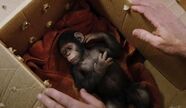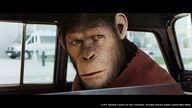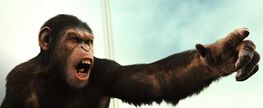Chimpanzees, as the primates closest to humans, are regarded as the best experimental objects by scientific research. Natural science is used for drug experiments and analysis of brain structure, while social sciences such as anthropology are used to investigate the origin and formation of human norms, behavior, and society. Because the orangutans in this film have acquired extraordinary intelligence by accident, they have sprouted an independent consciousness, unyielding oppression, and united their species to return to their forest homes. It is like a repetition of the long process of human evolution and the establishment of social systems. An orangutan has all the qualifications to be a leader: high IQ and superb governance methods: temptation and threats, as well as win over the hearts of the people and choose confrontation strategies. Caesar has a well-deserved reputation.
Independence of Animal Sociology This
film makes people think about the difference between humans and animals. Human beings not only kill each other to the species they belong to, but also act as a slaughter of species on the earth. For all non-human species, they are regarded as stupid, speechless lambs to be slaughtered. And the means of tame and control are technology and violent tools (collar tranquilizer electric stick high-pressure water tap-the same as for Rimbaud). Caesar's gesture change in this film also symbolizes the awakening of independent consciousness. Before it was brought into the forest, it took the initiative to get the owner's request. At the end of the film, it rejected the request of the owner and father to return to the human family, thinking that the forest is their real home.
The epitome of human tragedy The
central "character" Caesar in this play is actually derived from the tradition of Greek tragedy, that is, a story of a mixture of human and god genes that has gone through hardships and eventually became a human hero. But the tragedy of a hero is that good people have no intention of doing wrong things, and doomed to their fate (such as Oedipus killing his father and incest, the relationship between Caesar and his human guardian, his father, is similar). The hybrid of the orangutan Caesar makes people wonder whether his (his) escape from the animal custody is a rebellious adolescent (human intelligence animal body) or whether it comes from a sense of identity of the species. In addition to having the same characteristics of people (independent consciousness, language, social behavior, etc.), what does Caesar lack from a real person? Or is this sensational movie asking us to ask ourselves: What do we have more than animals? Is it because the sense of morality is not good?
Extended reading: "The Naked Ape Trilogy"
View more about Rise of the Planet of the Apes reviews











